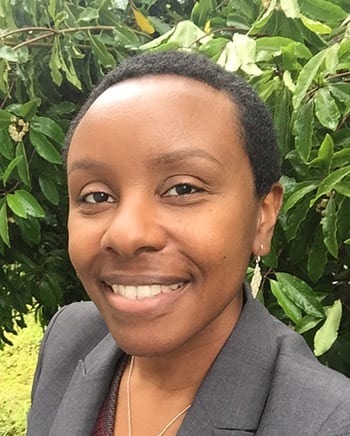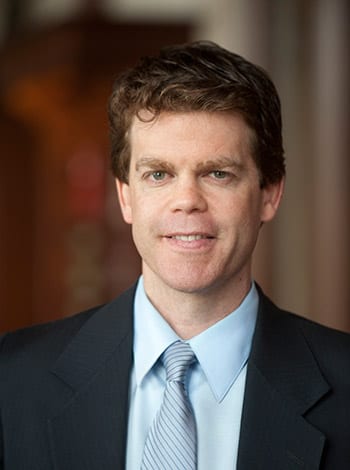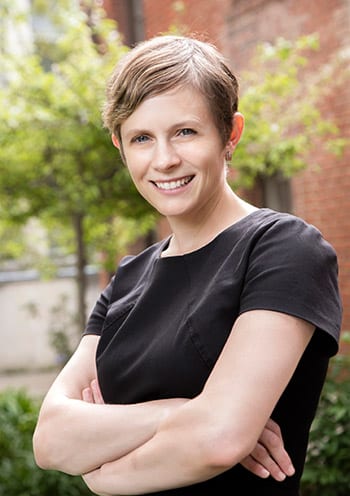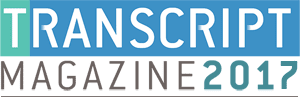FACULTY PROWESS HELPS ATTRACT THREE NEW PROFESSORS TO BERKELEY
For Abbye Atkinson, Adam Badawi ’03, and Joy Milligan, joining Berkeley Law’s faculty is as humbling as it is thrilling.
Atkinson calls her new cohort “unmatched in its intellectual depth and range.” Badawi notes that “the faculty was a huge part of what drew me back to Berkeley.” Milligan, a fellow at the school, says “there’s no law school faculty I admire more.”
The three newcomers start on July 1 and begin teaching this fall.
VERSATILITY PERSONIFIED

Atkinson’s new gig represents a homecoming of sorts. A Stanford Law School fellow and lecturer, she earned her undergraduate degree in Dramatic Arts at UC Berkeley—where she was a Regent’s Scholar and received the Mark Goodson Prize for distinction in the performance arts.
At Harvard Law School, she served as a research and teaching assistant to Professor Elizabeth Warren, now a U.S. senator, on a consumer bankruptcy project and Bankruptcy Law course.
“She was a master teacher who always encouraged me to think about the law’s real-life implications,” Atkinson says. “That’s been a huge influence in how I’ve approached my scholarship.”
Atkinson has enjoyed a rewarding and varied career, working as a special-education teacher, a clerk for two federal judges, and an associate with Gibson Dunn & Crutcher in San Francisco. At Stanford, her research probed bankruptcy law’s impact on the economically vulnerable.
“Bankruptcy Law concerns itself with helping people who are in a precarious financial position rebuild themselves,” she says. “We often think about that in a middle- or upper-class context. But if bankruptcy is an important mechanism to let people reboot financially, why does it exclude people on the lower end of the socio-economic spectrum—people whose financial troubles are often borne of bigger social issues?”
Another strong pull for Atkinson: the recent explosion of consumer justice work at Berkeley Law. “It’ll be great to get involved in that community,” she says.
HOMEWARD BOUND

While he enjoyed his two years as a University of Chicago law fellow and lecturer and seven years as a professor at Washington University of St. Louis, Badawi—who earned three degrees from UC Berkeley—relished a chance to come back.
“There’s nowhere like it,” he says. The prospect of joining the business law program, which he says is “influential, energetic, and thinks about research and teaching in innovative ways,” made returning to Boalt “an easy decision.”
Badawi clerked on the U.S. Tenth Circuit Court of Appeals and practiced at Munger, Tolles & Olson for before entering academia. His research focuses on shareholder litigation, how boards operate, and how debt contracts and corporate governance interact. A current project explores the influence lawyers and law firms have on the public disclosures they help draft for clients.
“What draws me to business-related research is the importance that effective corporate governance has for producing growth and employment in our economy,” he says. “It helps that there are massive amounts of data available on how firms and corporate governance interact.”
Currently co-writing a Business Associations casebook, Badawi wants his students “to think about how lawyers can improve deals rather than just win the litigation that results when those deals turn problematic … I know the Berkeley student body’s love of intellectual engagement and commitment to its ideals will never go away. That makes for a dynamic classroom and I can’t wait to be a part of it.”
FAMILIARITY BREEDS RESPECT

The more Milligan interacted with Berkeley Law’s faculty, the more she wanted to join it. “The depth and diversity of their work is truly world-class,” she says.
Her research considers the impact of American law and political institutions on entrenched inequality, specifically how the civil rights movement links with the administrative state’s institutional design. One recent project compared the trajectories of racial and religious discrimination in the Supreme Court’s constitutional jurisprudence.
“The fundamental question in civil rights law is why do we still see so much entrenched inequality— particularly racial inequality after the ‘Civil Rights Revolution?’” Milligan says. “Why has law not been more effective in bridging this gap? That issue underlies my research.”
Currently finishing her Ph.D. in Berkeley Law’s Jurisprudence and Social Policy Program, Milligan has earned degrees from Harvard (undergraduate), New York University (JD), and Princeton (MPA).
After law school, she worked for the NAACP’s Legal Defense & Educational Fund and clerked on the U.S. Ninth Circuit Court of Appeals. Looking ahead to teaching at Berkeley Law, she values a pragmatic approach.
 “In Civil Procedure, I want students to learn the key practical tools and know how to use them, because I’ve seen firsthand how procedure impacts the fate of cases,” Milligan says. “In Antidiscrimination Law, I want students to understand where the stumbling blocks are for civil rights plaintiffs.”
“In Civil Procedure, I want students to learn the key practical tools and know how to use them, because I’ve seen firsthand how procedure impacts the fate of cases,” Milligan says. “In Antidiscrimination Law, I want students to understand where the stumbling blocks are for civil rights plaintiffs.”
—Andrew Cohen